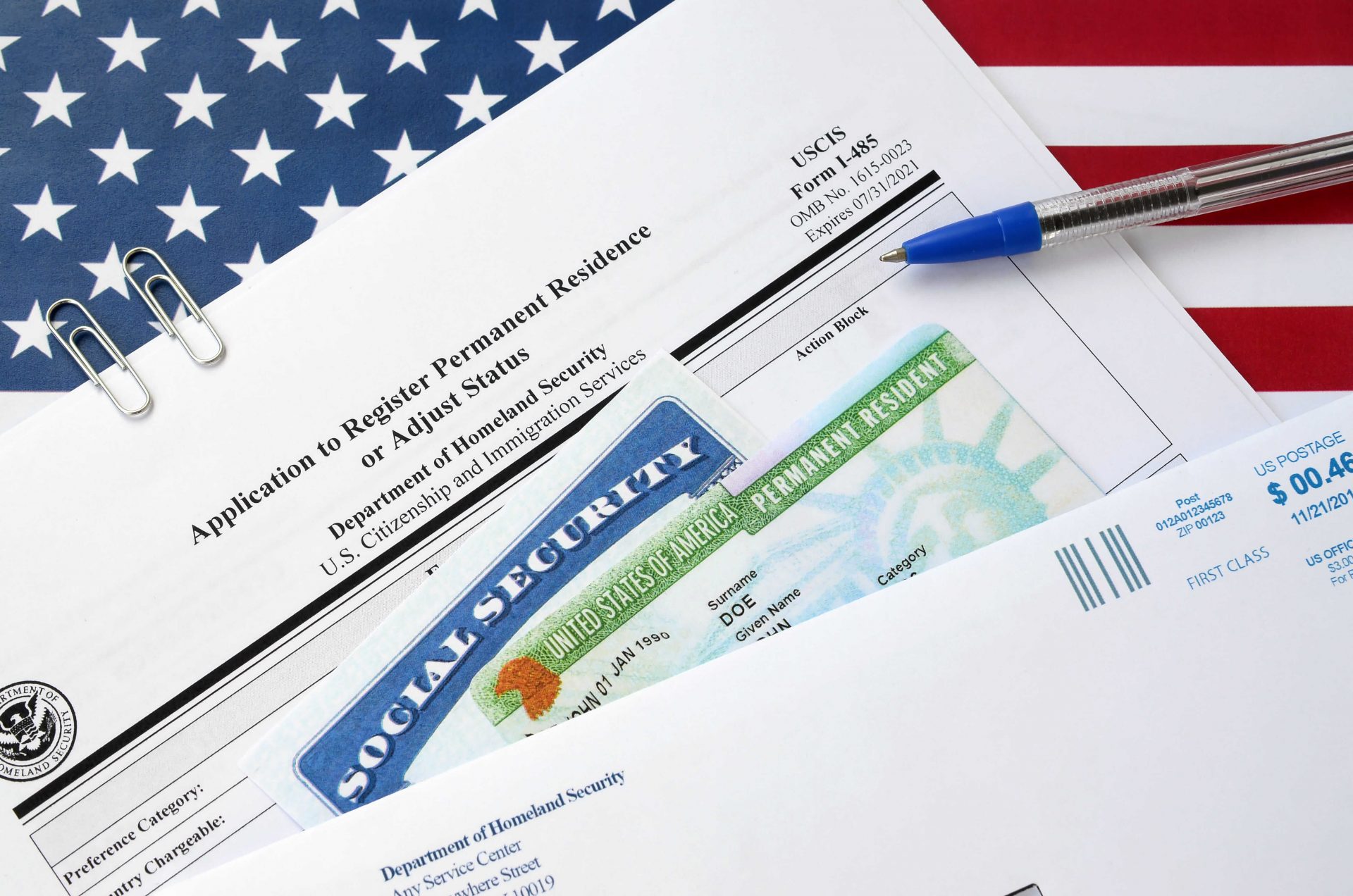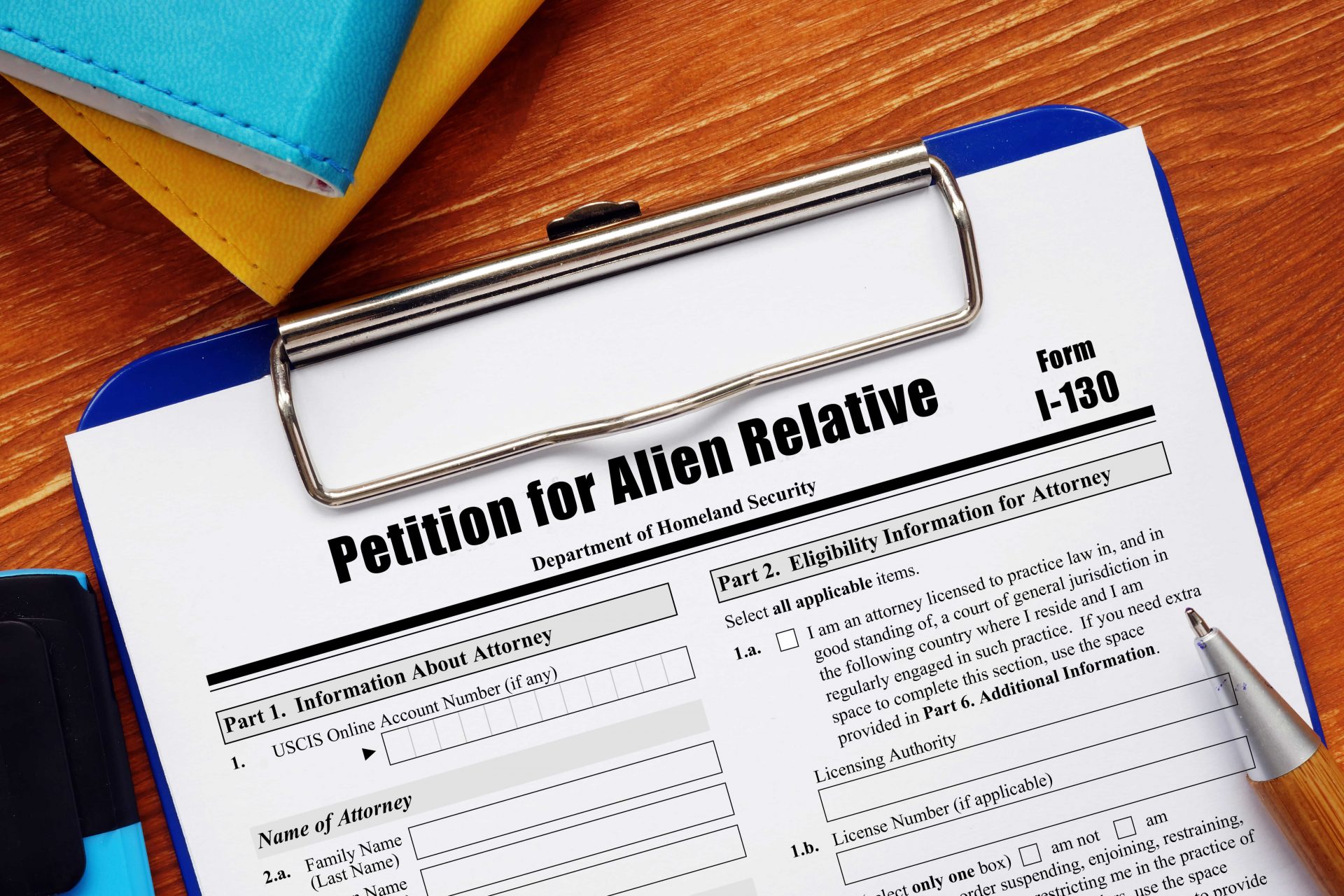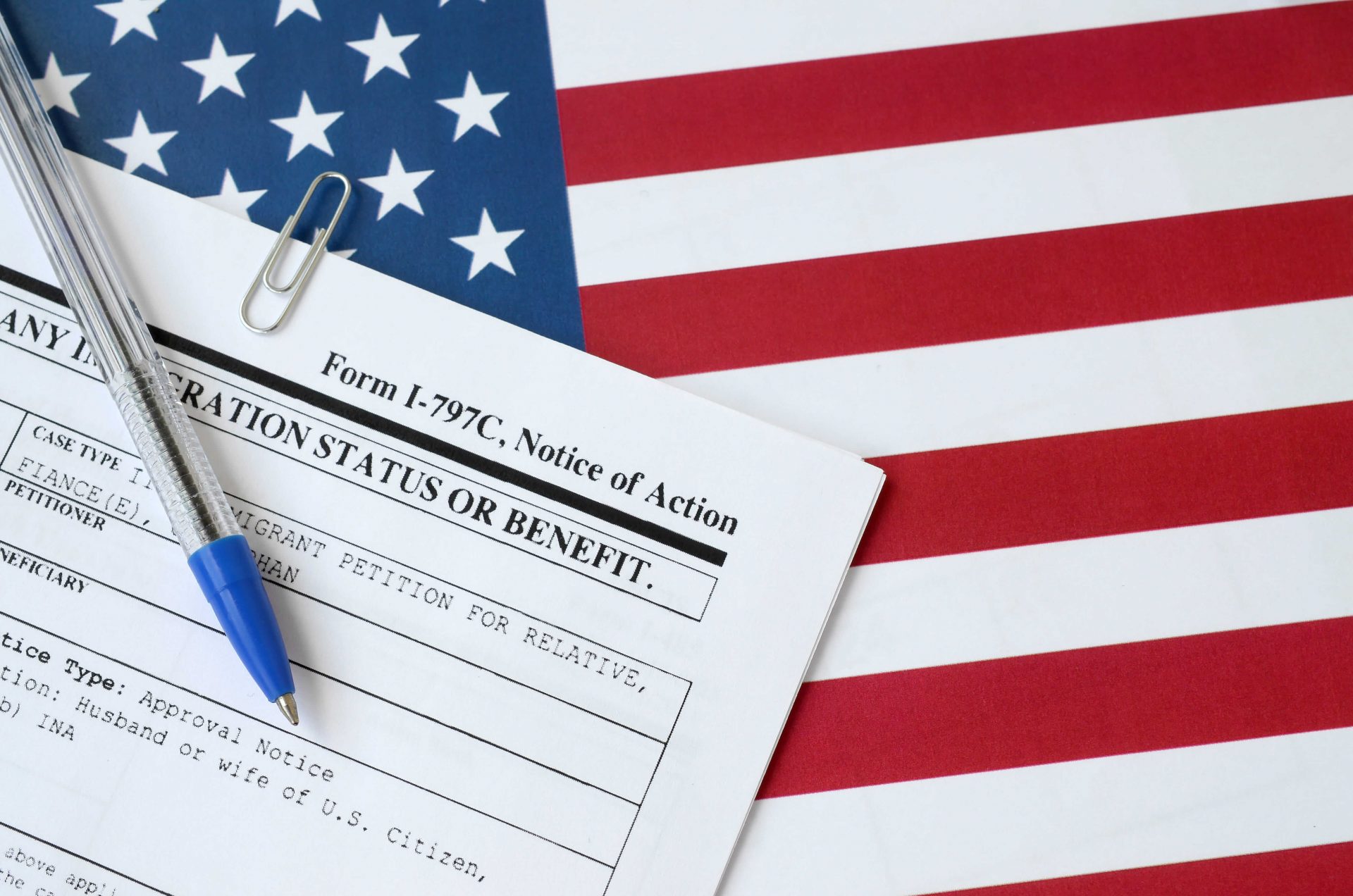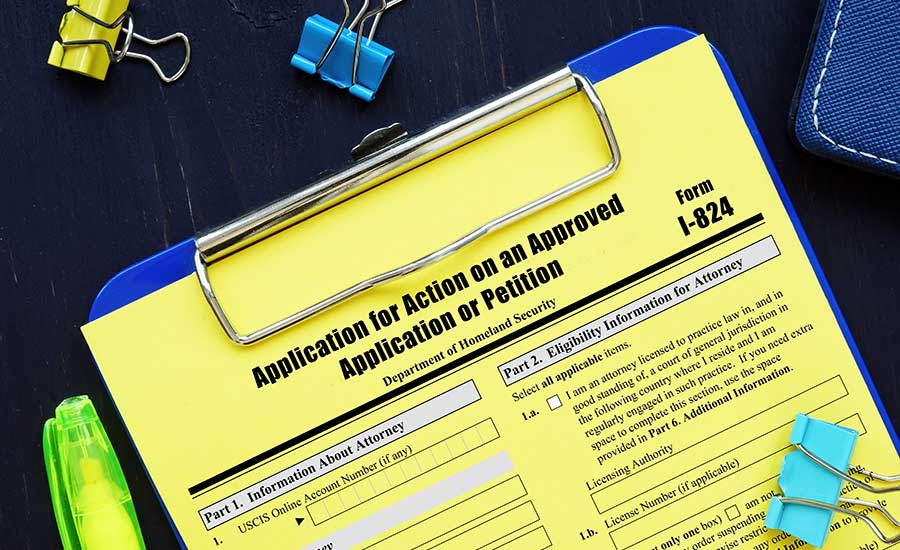

Applying for a Green Card, citizenship, or another immigration benefit can be overwhelming — especially when it comes to completing immigration forms, where any error can cause delay or denial of your application.
Combined with frequent changes in filing fees and varying processing times, the challenge may seem too big to face.
We will share the most common immigration forms, recent changes in USCIS fees and how Spar & Bernstein can help you navigate the U.S. immigration process.
What Is An Immigration Form?
An immigration form is an official document required by the U.S. Citizenship and Immigration Services (USCIS) or other governmental agencies to process different requests related to U.S. immigration.
These forms can serve various functions, such as:
- Applying for U.S. citizenship
- Obtaining a Green Card
- Sponsoring family members
- Acquiring work authorization
Each immigration form has specific requirements, filing instructions and often comes with related fees to cover processing costs.
How To Access & Submit Immigration Forms
Filing the correct immigration form is the first step toward obtaining your desired status in the U.S. Here is how to get started:
- Find the form: Visit the USCIS website and navigate to the All Forms section to search for the specific form you need.
- Filter by category: Use filters to sort forms by categories like citizenship, Green Card, family-based, or employment-based forms.
- Review instructions: Carefully follow the form instructions to ensure accuracy and reduce the risk of application denial.
- Download or complete online: Download the form as a PDF for manual completion or fill it out directly online if available.
- Submit the form: Send your completed form electronically or by mail, including all required documents, plus a document verifying payment.
- Track your application: Check your application status on the USCIS website or work with a trusted immigration lawyer who can do that for you.
Common Immigration Forms When Applying For A Green Card
To apply for a Green Card, you’ll need to file a series of specific forms, each serving a unique role in the immigration process.
Form I-130, Petition For Alien Relative
Form I-130 is filed by a U.S. citizen or lawful permanent resident to establish a qualifying family relationship for a foreign relative.
It marks the beginning of the Green Card process for family members like spouses, children or parents.
Form I-485, Application To Register Permanent Residence Or Adjust Status
Form I-485 is filed by an immigrant who is already in the U.S. and wants to adjust their status from a visa holder to permanent resident.
Form I-864, Affidavit Of Support Under Section 213A Of The INA
Form I-864 is filed by the sponsor to demonstrate financial ability to support the Green Card applicant, ensuring the immigrant won’t become a public charge.
Form I-765, Application For Employment Authorization
Form I-765 is filed by the Green Card applicant if they want to work legally in the U.S. while waiting for their application to be processed.
Form I-693, Report Of Medical Examination And Vaccination Record
Form I-693 is filed by the Green Card applicant to show they meet the health requirements set by USCIS.
The medical exam is conducted by an authorized doctor to confirm the applicant is free from any conditions that would make them inadmissible.
Form I-751, Petition To Remove Conditions On Residence
Form I-751 is filed by conditional permanent residents to remove the 2-year conditions on their Green Card. This allows them to obtain full permanent resident status.
Form I-90, Application To Replace Permanent Resident Card
Form I-90 is filed by Green Card holders who need to renew or replace their Green Card due to expiration, loss, or damage.

US Citizenship Immigration Forms
Here’s a breakdown of the most important forms used in the citizenship process.
Form N-400, Application For Naturalization
Form N-400 is submitted by permanent residents who wish to become U.S. citizens.
Form N-600, Application For Certificate Of Citizenship
Form N-600 is filed by individuals who acquired U.S. citizenship through their parents, either by birth abroad or naturalization and need to receive proof of citizenship.
Form N-565, Application For Replacement Naturalization/Citizenship Document
Form N-565 is filed by U.S. citizens who need to replace a lost, damaged, or stolen Certificate of Naturalization or Certificate of Citizenship.
Form N-426, Request For Certification Of Military Or Naval Service
Form N-426 is completed by people who served in the U.S. military and are now seeking naturalization.
N-470, Application To Preserve Residence For Naturalization Purposes
Form N-470 is filed by U.S. permanent residents working abroad to preserve their continuous residence status for naturalization.

Other Immigration Forms You Might Need
Different scenarios in the immigration process may require additional forms. Here are a few examples:
Form I-131, Application For Travel Documents, Parole Documents, And Arrival/Departure Records
Form I-131 is filed by:
- Permanent residents planning to travel outside the U.S. for an extended period (usually more than one year) to avoid losing their status
- Green Card applicants who need permission to return to the U.S. while their immigration applications are being processed
- Asylees and refugees who need permission to travel abroad and return to the U.S.
Form AR-11, Alien’s Change Of Address Card
Form AR-11 is submitted to notify USCIS of any address change within 10 days of moving.
This is important to keep immigration records up to date and avoid missing critical communications.
G-1145, E-Notification Of Application/Petition Acceptance
Form G-1145 is submitted by applicants who want to receive electronic updates by email or text when USCIS accepts their forms.
Form I-865, Sponsor’s Notice Of Change of Address
Form I-865 is submitted by individuals who have filed an Affidavit of Support to update their address, ensuring they remain compliant with their sponsorship obligations.
Form I-539, Application To Extend/Change Nonimmigrant Status
Form I-539 is filed by nonimmigrants seeking to extend their stay or change to another nonimmigrant status — for example, from a tourist visa to a student visa, depending on their circumstances.
Form I-589, Application For Asylum And For Withholding Of Removal
Form I-589 is completed by individuals seeking asylum in the U.S. or protection from removal due to fear of persecution in their home country based on race, religion, nationality, political opinion, or membership in a social group.
Form I-797, Notice Of Action
Form I-797 is sent by USCIS to acknowledge receipt or approval of an application or petition in immigration processes like Green Cards or visas.
Immigration Forms: Changes In USCIS Filing Fees
On January 31, 2024, USCIS announced a final rule adjusting certain immigration and naturalization fees. The adjustment will help USCIS recover more of its operating costs and improve processing times.
The increase in fees became effective on April 1, 2024.
Some of the new fees for filing common immigration forms include:
- Form I-130: $675 for paper filing and $625 for online filing.
- Form I-485: $1,440. If the applicant is under 14 years old and is filing Form I-485 at the same time as one of their parents, the fee is $950. There is no fee for people filing under Violence Against Women Act (VAWA), refugees, U visa holders and T visa holders.
- Form I-765: $520 for paper filing and $470 for online filing.
- Form N-400: $760 for paper filing and $710 for online filing.
- Form N-600: $1,385 for paper filing and $1,335 for online filing.
Our experienced immigration lawyers at Spar & Bernstein will provide updates in filing fees for immigration forms, helping you avoid delays or additional costs caused by incorrect payments.
Immigration Forms: Processing Time
The processing time for immigration forms varies based on the type of application submitted and other factors, such as USCIS offices’ current workload, required background checks and need for additional documents.
Check the estimated processing times for your specific forms on the USCIS website, where updates are regularly posted to reflect changes.
- 15.5 months when a U.S. citizen files for a spouse, child under 21, or parent
- 53 months when a lawful permanent resident files for a spouse or child
- Between 10 and 27 months for family-based applications, depending on the service center where the application is processed
- Between 10 and 30 months for employment-based applications
- Form N-400: 6 to 9 months depending on the service center processing the application
- Form N-600: 5 to 10 months depending on the service center where the form is processed
Need Help With USCIS Immigration Forms? Contact Spar & Bernstein
With 60+ years of experience in immigration law, The Law Offices of Spar & Bernstein help clients navigate the complexities of completing and submitting various immigration forms for visas, Green Cards, Naturalization, and more.
Our knowledgeable team stays informed about the latest changes in USCIS policies, including filing fees and required documentation, so you can be confident your application meets all current requirements.
We ensure each form is accurately filled out and provide personalized guidance based on your specific immigration needs, offering legal representation if complications arise.
Whether you are applying for a visa, Green Card, or U.S. Citizenship, Spar & Bernstein makes the immigration process seamless.
FAQs About Immigration Forms
If you still have concerns about USCIS immigration forms, check the frequently asked questions below.
How do I know if my immigration form is complete?
Ensure you complete all required fields, attach necessary supporting documents, and pay any applicable fees. To stay on the safe side, contact our knowledgeable immigration lawyers at Spar & Bernstein who will help you prepare and file all necessary forms.
What should I do if my immigration form is denied?
Review the reasons for denial and explore the option to appeal or submit a new application. Consult our experienced attorneys for further guidance.
Do I need to work with a lawyer for immigration forms?
While not mandatory, working with a lawyer on filling and submitting your immigration forms can have a number of benefits, such as reducing the risk of errors, ensuring timely submissions, and navigating complex eligibility requirements.





